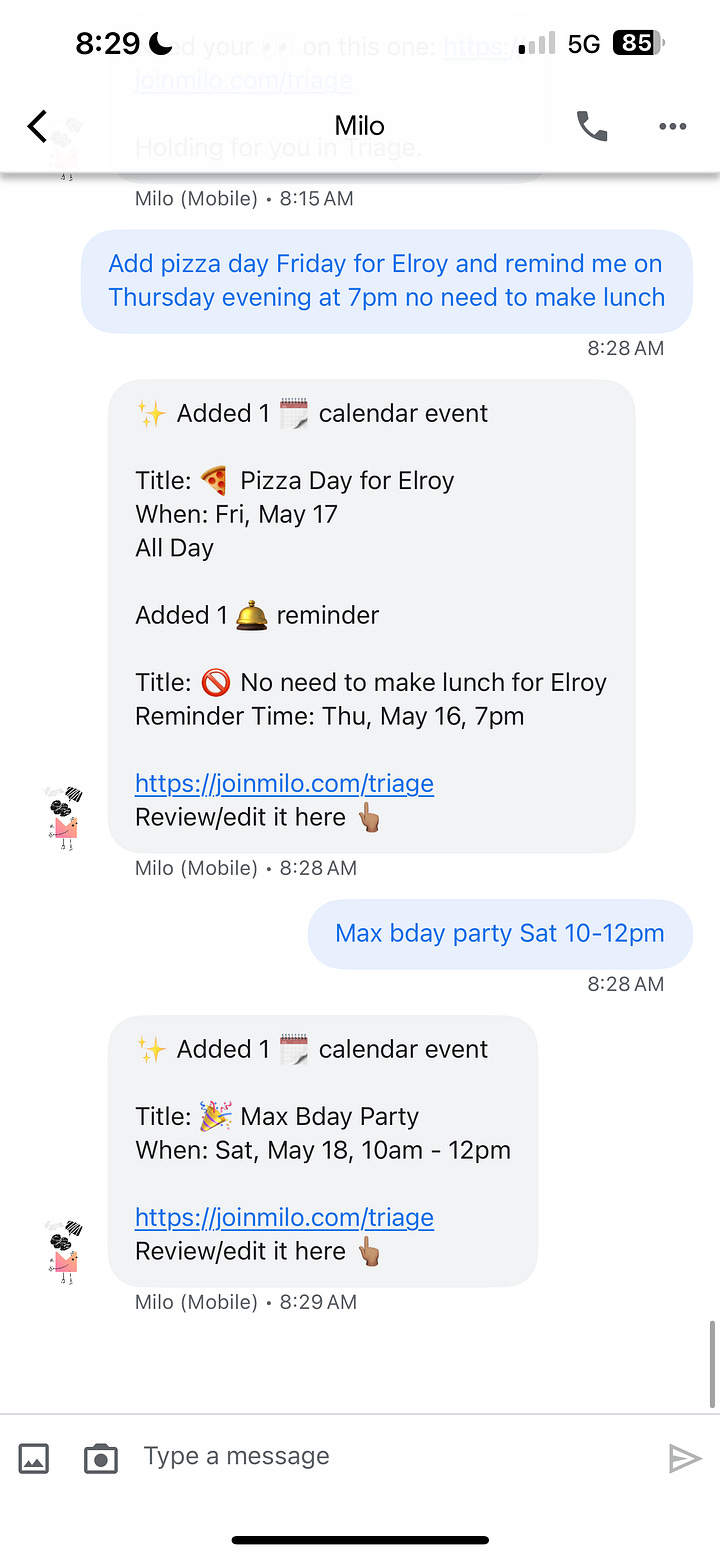⚡️ tl;dr
when our brain’s working memory - the part that is able to handle multiple things at the same time - is overloaded, we end up feeling scattered and overwhelmed
the more you can free up space, the greater your ability to think through things while also reducing anxiety
one approach is called braindumping: emptying it out to an external storage place
there are lots of ways to braindump but we suggest three to try out

👋🏽 Intro:
Tell me if this sounds familiar: in your mind right now, you’ve got all of the things you need to get done today, what’s for lunch and dinner, the people you need to get back to, the kids’ schedules and probably 43 other things.
This is called using your brain’s working memory. It’s the part of your brain used to hold information and put it to work doing daily tasks. It’s meant to be light and easy to access but we’ve been overloading it with our modern digital lives and they’re getting fried from chronic misuse.
And while it’s not just a parent thing, it’s a more urgent and ongoing issue for parents - because not only are our brains full of work things, we also have all of the home and family things. And once the kids hit school, the information explodes. All of the events on the schedule and people to coordinate and logistics to wrangle.
And because we don’t have great tools to do it with, most of us are left to use our working memory.
Which is why it feels like it’s short-circuiting and melting down.
It’s the core issue I’ve been trying to solve for with Milo so I wanted to share the highlights of what I’ve learned.
🤓 The 101:
1. 📥 Working memory is our brain’s workspace - like a mental Post-it note or whiteboard. It’s meant to temporarily hold and work with information in our minds and should be working with ~7 pieces of info at a time (Miller’s Law). That information stays active for 10-30 seconds at a time unless we actively maintain it. Importantly - our working memory is different than short-term memory in that it not only stores the info, but manipulates it so that we can do complex things like decision making, problem solving and reasoning and then focuses our attention on the details, while filtering out distractions.
2. 💥 Modern lives have overloaded our working memory. The speed and influx of info and messages, the constant interruptions, the context switching … it means we’re never really focusing on one thing at a time, we’re jamming our brains full of more info that we can hold and we’re asking it to do more things than it can do at one time.
Our human brains were never meant to deal with more than 5-9 pieces of info at a time, let alone the firehose of emails/texts/alerts plus the constant distractions, interruptions and multi-tasking.
3. 😫 The impact is pretty wide-reaching: stress, trouble remembering, lost focus, irritability, issues sleeping. This part shouldn’t feel like a surprise but there is lots of data to show that the impact of overloading our working memory is things like increased stress and anxiety, trouble focusing (have you tried reading a book for 15 minutes? It feels painful to focus), mood and sleep issues. Worse - because this has been going on for so long, we’re now in official burnout and impairing overall brain function land. All those thought pinging around in our heads are also impacting our sleep.
4. 📝 One proven helper is braindumping. There are multiple ways you can rescue your working memory - from meditation to actively focusing on only one thing at a time. But understanding the realities of the world we live in, I’ve been most interested in the things that feel effortless while being effective, which brings us to the concept of: braindumping. It’s pretty much what it sounds like: the act of just getting everything out of your brain in an easy, unfiltered way. This process of “emptying” your working memory into an external place lowers the cognitive load by making space for the ~7 things your working memory should be focused on.
5. 🎨 Bonus? It can boost creativity and better decision making. Not only does it improve the issues already discussed above like stress, sleep and focus, making space for your working memory has been shown to help with creativity because now your brain is able to generate new ideas and connect dots. Probably more importantly, with more space to focus attention, you can also make better decisions by more clearly seeing all the info and having the bandwidth to properly evaluate options.
👇🏽The details:
Thinking of your working memory like a cup - when it’s overfull, adding more things just makes everything spill over. The key is to empty it regularly, and to keep it from reaching full.
This doesn’t mean having nothing in there, but rather only the 5-9 things to deal with whatever is at hand. Everything else needs a place to go (and a single place so you don’t feel even more scattered with notes everywhere.)
Braindumping acts like an external storage system - reducing your cognitive load while improving your brain’s function and ideally it’s a storage system that not only holds those extra thoughts but can organize them for better access later.
🧰 Your options:
There are lots of ways to braindump but after testing for practicality and effectiveness, I prefer these three. Likely you'll use all of these in different cases but the key is to empty your working memory often and quickly so it has the room to actually function with space and flexibility.
1. ✏️ Freewriting. One way to start the day with a clear mind is to spend 10-15 min just aimlessly writing. Can be in your journal, an Apple Note or, I use this little guy every morning. Some people call it Morning Pages but it doesn’t have to be 3 pages or 750 words. Just a consistent habit of stream-of-consciousness writing that gets all of the noise out so you can get to the good stuff.
You can also do a different version right before bed - keep a journal by your bed and just get everything out from the day, onto the pages. Most important: no filtering. These words are not meant to be used but rather just to get out.
2. 🎙️Voice memo. For some, writing feels hard or for some times, talking it out works better. So pull out your phone’s voice memo app and just start recording - this is really great in the car or when your hands are busy washing dishes or folding laundry.
Even better - you can now talk to one of the AI chatbots who can help you sort through all that clutter. My fav is Claude.
3. 📝 To-do list/note/journal. Because so many of the things we’re trying to remember are to-dos or reminders, it can help to have one place to get it out of your mind and easily organized. The key is to not overly think of which list or where. It has to feel easy and reflexive so you don’t lose the thought on the way to dumping it. It’s why many people just text or email themselves (and why we use this for Milo).
⚡️ Tools to try:
✏️ Sprinter: try a 10 or 15 minute session of just freewriting with this simple browser page.
📲 Claude: you can try it on desktop but I’d recommend downloading it onto your phone and taking a walk with the voice to text feature. ChatGPT has a better fully voice interaction so it feels like a conversation, but I find Claude is my go-to for the kind of nuance a good stress-filled braindump needs.
💬 Milo: Not surprisingly, given that cognitive overload has been the central thing I’ve been trying to solve for, braindumping is pretty central to the experience. But in this case, there are two parts to it:
You don’t use working memory to store any info that isn’t immediately needed. The first part is to make it easy to braindump any reminders, to-dos, info and have it be held in one place - so you don’t have to remember you’re out of ketchup, whether the kids need their library books today or what time the bday party starts.
Have the info be organized so that it’s where you need it when you need to get back to it. Instead of having yet another inbox you have to organize, Milo can take the grocery item and add it to the grocery list, add the bday party to the calendar or send a reminder of exactly what’s needed today for school. I believe in simplicity so there are only so many places the info can be stored - Calendar, some Tasks lists (eg to-do, grocery, to-discuss) and some Info lists (eg contacts, bdays, recipes).


Et voilà- you both make room in your working memory by not holding the info in the first place, and you don’t tax it with things that don’t need to ever be remembered via working memory.
📚 Worth reading/listening to or checking out:
🎙️ Ezra Klein podcast on attention: Tired? Distracted? Burned Out? Listen to This.
🗞️ Guardian article on Morning Pages: This column will change your life: Morning Pages
⌨️ Freewrite







Share this post